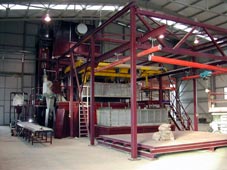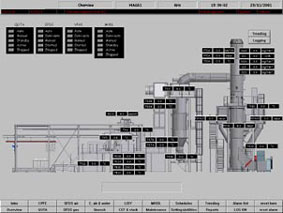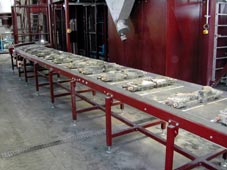Zele, Belgium - October 2, 2003 - Seghers Keppel Technology, a world leader in advanced thermal cleaning solutions, waste degrading and bulk handling systems, today announced that it has been selected to deliver its Fluidised Bed Rubber Denuding system to a US army tank tracks and road wheels refurbishing facility at the Red River Army Depot in Texarkana, USA.
Hendrik Janssens, General Manager of Seghers Keppel Technology Zele said, "This selection came after an in-depth evaluation among competitive offerings. The contract was granted to our US office, Seghers Keppel Technology, Inc., based on the decision that our proposed system represented the best return on investment for the US government. With this win, we are advancing our strategy of broadening our position in the thermal cleaning market and strengthening Seghers Keppel's goal of becoming a number one player in this market segment."

The Fluidised Bed Rubber Denuding System was selected for its superior technology, meeting all the requirements of the continuously changing environmental legislation and the US military. This technology is accompanied by all necessary equipment for the safe and good operation, responding to the latest US and international standards.
The proposed system has already been engineered, manufactured and supplied by Seghers Keppel Technology for services & machinery Zele for a similar application on army tracks and road wheels at the Volos plant in Greece.
The Rubber Denuding System is an industrial two-stage fluidised bed designed to degrade waste streams and convert them into dry inert solids. The system is a proprietary technology using a silica fluidised bed device, operated at medium temperatures to create a very intense and fast degrading reaction for "organic" waste. The system includes all auxiliaries for controlled feeding, post-combustion and flue gas cleaning of the reaction gases.

Rubber Denuding can be hazardous and involve difficult working conditions as well as raising environmental issues. It is normally a slow process and thus limits rapid turnaround of parts. Seghers Keppel Technology Zele has reversed all these deficiencies. The process is fast, inherently safe, user-friendly and free of environmental risk.
Seghers Keppel works on the fundamental principle that forcing air through sand at a well-defined speed makes the sand behave as a liquid: it is fluidised. In practice, air and gas are injected at the bottom of a sand-filled vessel into which the parts are loaded.
The gas-air mixture is ignited at the upper surface. The heat of combustion is absorbed by the bubbling sand mass which remains at a controlled 425 – 500 °C. Complex organic compounds such as rubber, paint and plastics are rapidly broken down by gasification processes.
The generated process gases are further oxidised with heat and excess oxygen before entering an advanced scrubbing unit from which the clean gases are released into the atmosphere.
As a result of the total gasification of the solid rubber, paint or plastic, the parts are totally clean when removed from the fluidised bed. Quick cleaning times ensure that cleaning is no longer a bottleneck in the operation and hence greatly increases the overall efficiency of the plant.
The timeframe to deliver this project is 16 months.

Contact:
Seghers Keppel Technology for services & machinery Zele nv
Tel. +32 9 367 94 94
email: info_zele@segherskeppel.com
Top page


